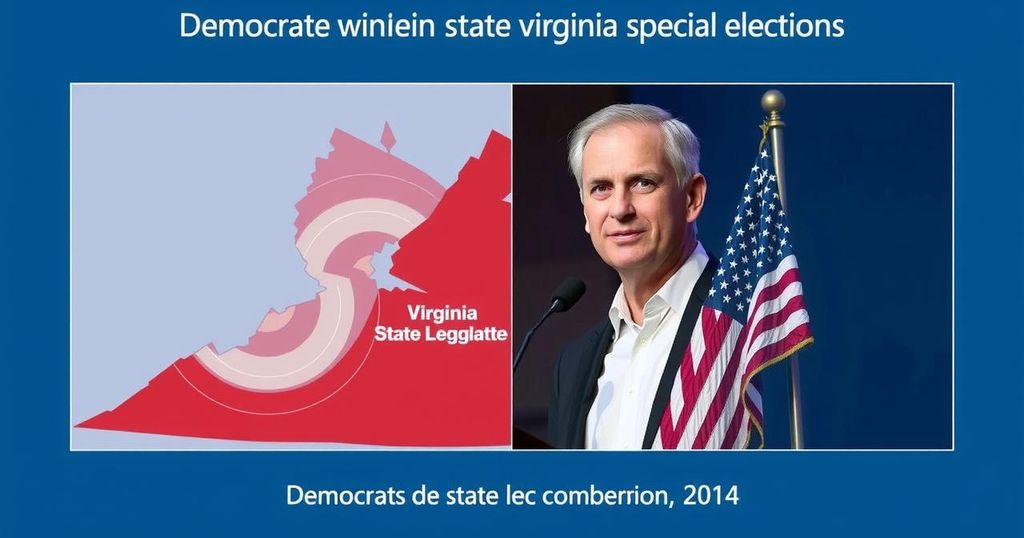Virginia Democrats Secure Legislative Seats in Special Elections, Key for Future Control

Democrats retained their narrow majorities in the Virginia state legislature during special elections, winning two key seats in Loudoun County. While Republicans held onto another seat, the overall results indicate a continued Democratic influence amidst challenges from the Republican Party, particularly in light of recent shifts toward Trump. The elections signal critical implications for legislative agendas in Virginia as both parties prepare for future contests.
Democrats successfully retained their slim majorities in the Virginia state Legislature following special elections held in two seats on Tuesday, as projected by the Associated Press. Democratic state representative Kannan Srinivasan triumphed over Republican candidate Tumay Harding to secure an open Senate seat in Loudoun County, a suburban area of Washington, D.C. Meanwhile, Democrat JJ Singh defeated Republican Ram Venkatachalam for an open House seat in the same region.
Despite the Democratic victories, Republicans managed to maintain a Senate seat west of Richmond, where Republican Luther Cifers defeated Democrat Jack Trammell for a position previously held by John McGuire. These special elections, occurring just after Congress certified Donald Trump’s 2024 presidential win, acted as an early indicator of voter enthusiasm for both political parties amid Trump’s anticipated return.
Given the Democratic tendencies of the districts—where prior incumbents won both seats by about 61% in the 2023 elections—Democratic officials approached the contest with cautious optimism. They expressed awareness of Trump’s increasing support in the area, particularly as early voting coincided with the holiday season and a significant winter storm impacted conditions in Loudoun County. Notably, both Democratic candidates notably outspent their Republican counterparts.
In the context of recent elections, the outgoing president garnered 10,000 more votes in Loudoun County in 2024 compared to 2020, whereas Vice President Kamala Harris’s vote tally fell short by 9,092 compared to President Joe Biden’s performance in 2020. While Biden won the district with a 25-point margin, Harris’s lead decreased to 16.2 points.
Republican strategies were anchored on Trump-inspired issues, including tax policies for service workers and border security measures. Prominent figures in the GOP, including Governor Glenn Youngkin, rallied in support of Harding and Venkatachalam as early voting concluded.
Democratic candidates emphasized the necessity of maintaining control over the state legislature to counteract Trump’s influence. Losing either seat would have resulted in a tied situation in the House or Senate, jeopardizing Democratic initiatives aimed at constitutional amendments concerning voting rights, marriage equality, and abortion access. According to Roger Lau, deputy executive director of the Democratic National Committee, “As we face increasing extremism at the federal level… it’s more important than ever for Democrats to fight back in the states, build local power, and win elections up and down the ballot.”
With these elections, Democrats now hold a 21-19 majority in the state Senate and a 51-49 majority in the House, providing them a strategic advantage. This outcome is seen as encouraging for Democrats, who aim to replicate the blue wave experienced during Trump’s initial presidential term in 2017, which resulted in winning the governorship and significant legislative gains. Looking ahead to November, both parties will contest for control of the House and to elect a new governor succeeding the term-limited Youngkin. Heather Williams, president of the Democratic Legislative Campaign Committee, remarked on the election’s significance, stating, “While we celebrate tonight, our focus is already on November… building and defending Democratic power in the states is essential.”
This article discusses the special elections held in Virginia, where Democrats successfully defended their seats in the state legislature. The results are significant given the changing political landscape in the state, notably as it transitioned toward support for Donald Trump in the recent elections. With the upcoming political contests and the implications of these results for both parties, understanding the background of Virginia’s voting patterns and demographic changes is crucial.
In conclusion, the recent special elections in Virginia signal a sustained Democratic presence in the state legislature, crucial for countering potential Republican advances. With a 21-19 majority in the State Senate and a 51-49 majority in the House, Democrats are strategically positioned to pursue legislative goals related to voting rights and social issues. The upcoming November elections will provide further insights into the evolving political dynamics in Virginia, where both parties will seek to strengthen their foothold. To this end, the focus on local governance remains paramount.
Original Source: www.cnn.com







